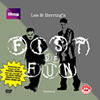Press Archives
Stewart Lee Press
STEWART LEE ON HOLLYWOOD
In this Sunday Times Culture supplement article Stewart Lee describes his experiences in trying to sell his film script 'Saturated' in Hollywood.Broadsheet newspaper articles come in ugly swarms.
Last week's infestation of the third page "fun" story slot came in the form of wedges of rumour and conjecture about the sudden success of British comedians and comedy writers in Hollywood, but you can't make cast-iron trends out of mere coincedence.
Readers with long memories will recall how this article did the rounds at the turn of the decade, when Rik Mayall and Lenny Henry went west with the cinematic triumphs of Drop Dead Fred and that film you can't even remember the name of.
Rowan Atkinson's Mr Bean is our only real international transfer, which just goes to show that people find the portrayal of the borderline mentally ill hilarious in any language. The only difference with the "Britcom Talent Abroad" thinkpieces this time around is that I read my own name in last week's Guardian among those who have allegedly "signed a deal in Hollywood".
So before we wheel out Colin Welland to stand up at the Oscars and shout out "The British are coming" once more, and then watch as the British determinedly fail to show, here's my experience of sleeping with the enemy.
After fiddling with half-finished fragments for the best part of a decade, I finally wrote the first draft of my film script in a single 36-hour session in a motel room in south Australia in March 1997, while the other visiting British stand-ups frolicked in the Jacuzzi beneath the window.
Saturated is the story of two south London musicians in a Dire Straits covers band, who traverse the Mohave desert in search of a lost 1960s rock icon, and along the way become involved in a masonic conspiracy to hide the Holy Grail on the moon.
Back then, I now realise, it was an overlong incoherant mess of incomplete scenes and grandiose set pieces, rather like George Lucas's final draft of The Phantom Menace.
Six months and a few fresh drafts later, I'd been "discovered", for probably the fifth or sixth time in my career, doing stand-up at the Montreal festival and flown out to Los Angeles by FOX TV, NBC and ABC to talk about doing sitcoms. The tedium was alleviated only by my manager agreeing to let me pitch any movie to anyone who'd listen. That was on Monday. By Friday I thought it was a done deal.
A woman from Fox's indie film wing read the script on Monday; on Tuesday she called to say she loved it; on Wednesday she was clearing the rights to the music I wanted; on Thursday we met a casting director; and on Friday they were offering it to the future There's Something About Mary star Ben Stiller to direct.
I realised getting a movie deal was easy, and that other people's failures were simply due to the fact that they were not as talented, charming and dynamic as me.
Then I never heard from Fox again.
I had learnt my first important lesson. The industry in LA is about keeping a set of plates spinning in the air rather than laying them out on the table and allowing people to sit down to a nice meal, but sooner or later you learn to sniff out the Yes! that really means Yes!
After the Fox thing I realised that I didn't really want to "sell" the script as such, that I didn't want to risk giving it away and seeing it spoilt.
Robin Williams's production company wanted to buy it and use the director of their choice, but my manager and I decided to try and raise the money ourselves. We got Steve Bendelac, the TV director who has just won a Golden Rose of Montreux for The League of Gentlemen series, to express an interest in directing, and started sending the script to British film companies for funds.
Despite all the fuss in the papers here about British talent, I think British film companies can only relate to stories about working-class people triumphing over adversity by undressing or playing musical instruments, or middle-class people in the past wearing oversized hats, and perhaps stripping off and playing musical instruments as well, though not at the same time.
BBC films blew hot and cold, Channel 4 didn't even blow, and Polygram described the script as offensive, unrealistic and incomprehensible. Meanwhile, European and Austrailian financiers were making approving noises, and in America a producer with the too-good-to-be-true Holywood name of Dan Lupowitz had become enamoured of the script.
Instead of going on about how it might "ride the bad taste gross-out trend", he said it was like Sam Shepard crossed with Terry Gilliam, and his two or three script-editing suggestions were so helpful and apposite, it was hard to believe he really worked in entertainment at all.
Snooping on the internet showed Lupowitz ran a production company, favoured first-time writers and directors, was currently working with Shepard, Dennis Hopper, Nick Nolte and Sharon Stone, and was in fact a real person. Lupowitz pointed us in the right direction, showed the script to the right kind of perverted freaks who would "get" it, and I eventually went back for another round of meetings in New York and LA in May this year.
Things started badly in the 105F heat of New York. The wide-eyed innocent abroad, I got conned out of $160 by a minicab driver on arrival, and my scheduled meeting with Miramax, who had been very optimistic, turned sour while I was on the plane over.
One of their current movies has religious themes so, America being what it is, they were caught up in fielding death threats against their staff from Christians and didn't feel they could commit to anything "controversial".
They asked me if I had any other ideas, so I petulantly improvised the most pornographic and blasphemous idea I could think of, garnered some nervous laughter, and left the meeting deciding not to let my personal feelings wrongfoot me in LA. Meeting financiers, distributors and casting agents in LA the following week was a triumph of my limited acting skills.
For one week only, I swallowed my surliness, asked for three cups of tea in every meeting, gushed with uncharacteristic enthusiasm, and flicked my remaining hair around like a prize Hugh Grant fop, giving them an Uncle Tom image of the English genius that they could relate to. "It's like Paris Texas on acid," they said, and acted surprised when someone wanting to make a film displayed a genuine knowledge of cinema. "It's amazing. It breaks the three-act rule, but it still works. How did you do it?"
I didn't really know there was a three-act rule, but had soon worked out a description of my own "Infinite Chinese Box" theory of scriptwriting, which I now think will be de rigueur in the next century.
I did 12 hours of performance every day, charming healthy young Americans at 7.30 AM breakfast meetings, and matching German film fanciers shot for shot in the evenings, buzzed up from a day of flouncing about and drinking far too much tea. I blagged some stand-up shows in LA, and got people down to see me, who left reassured that I had at least some ability to entertain.
In terms of the bigger picture, these indignities were a small price to pay for the progress we made, and by the end of the week we had enough definite interest to start showing the script to actors.
Attach a name and the final funding will come. But one dare not hope. One night, in a residental area of LA. I walked past a wastebasket overflowing onto the pavement with discarded A4 photographs of desperate young actors and actresses, while over Hollywood Boulevard, giant billboards of their colleagues who had climbed out of the trash can stared down impassively, up there surely as much by luck as by judgement.
My script, Saturated, is pencilled in to start shooting at the end of the year. I don't really want it to be part of the "next wave of British comedy talent in Hollywood". I wanted to make an international movie, something that transcends genre pigeonholing.
Maybe the last part of the finance could come from Britain, if I retitle it Paris Texas on Acid.
Source - The Curmudgeonly Lee & Herring Pages

